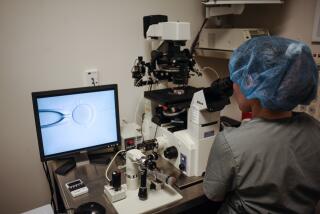British Stunned by Harvest of Organs at a Children’s Hospital
- Share via
LONDON — One of the leading children’s hospitals in Britain illegally harvested hearts, brains, eyes and other organs from thousands of dead children without the consent of their parents, according to a government report published Tuesday.
The report blamed a rogue pathologist at Alder Hey children’s hospital in Liverpool for systematically removing “every organ from every child who had a post-mortem” between 1988 and 1995.
But investigators also found stockpiled body parts, including the head of an 11-year-old boy, at the hospital and a Liverpool University research center that predated the term of Dutch pathologist Dick van Velzen. And a separate organ census issued by the Health Department on Tuesday indicated that removing body parts without “informed consent” is common in English hospitals.
The revelations come on the heels of admissions by Alder Hey, Birmingham Children’s Hospital and London’s Great Ormond Street Hospital for Children that they have sold live tissue removed from children during surgery to pharmaceutical companies for drug production--again, without the knowledge of parents.
The collection of organs for medical research is common in many countries, including the United States, and many of the Alder Hey families said they would have given their permission if they had been asked. They said they resented that their children’s bodies were “taken apart like scrap from old cars” without regard or respect for the families’ feelings.
“As far as I’m concerned, it’s like grave robbery,” said Tracy Fabiani, who lost a baby at the Liverpool hospital and was given the body back minus organs.
The organ scandals have fueled public distrust of the National Health Service, already rocked by the case of Dr. Harold Shipman, a beloved small-town doctor who authorities say may have murdered as many as 200 of his elderly patients in a career spanning 25 years. Shipman was convicted last year of killing 15 patients in the Manchester suburb of Hyde and is in prison. A government inquiry is to be held to determine how the killings continued undetected for so long.
Health Secretary Alan Milburn condemned the NHS this week for its anachronistic attitudes and called for a “revolution” in a medical culture that has put the word of a doctor and the needs of researchers above the rights of patients and parents.
“The days have gone where the NHS could act as a secret society. It cannot operate behind closed doors. It cannot keep patients in the dark,” Milburn said at a news conference Monday. “In the new century, patients need to be talked at less and listened to more.”
Speaking to Parliament on Tuesday, Milburn apologized to the families of more than 2,000 children whose organs were removed at Alder Hey. He blamed Van Velzen for ordering the “unethical and illegal” collection of organs and accused the pathologist of having lied to parents and falsified or stolen medical records to cover up his activities.
The case has been turned over to police, he said.
Van Velzen, an expert on sudden infant death syndrome, is on leave from his current job at a Dutch hospital and has been unavailable for comment. He is wanted by Canadian authorities in connection with a stash of children’s organs discovered in Nova Scotia, where he worked after leaving Liverpool.
Milburn told lawmakers that in addition to more than 2,000 children’s hearts, a large number of brain parts, eyes taken from fetuses, more than 1,500 fetuses or bodies from stillbirths, and a number of children’s heads and bodies were obtained without consent.
Documentation of the organs was “shocking and disrespectful,” according to the report. One entry relating to a 9-week-old fetus said: “Inflated monster. Humpty Dumpty.” They were stored in jars and stacked in a dingy basement for years.
The 500-page Alder Hey report said the store of organs remained largely unused for research or education. It said the government should consider disciplinary action against managers of the hospital.
The Liverpool hospital apologized Tuesday and announced suspensions of high-ranking staff.
Alan Jarvis, whose 4-year-old son, Matthew, died at Alder Hey in 1990, said he had no idea until late last year that his son’s heart, brain, lungs and testes were removed after his death.
“We thought that Matthew was cremated as a whole body, not a part body,” Jarvis told BBC radio. “But the essence of Matthew is left behind in a bucket in Alder Hey to this day.”
In issuing the separate Health Department organ census, the government’s chief medical officer, Liam Donaldson, said that law governing the removal and retention of organs from dead patients in Britain is “unclear, ambiguous and aging.” He said that many organs are taken without consent and that some hospitals may have “ignored and deviated from the law” by keeping body parts for decades for no purpose.
Donaldson said 100,000 hearts, brains, lungs and other organs are held by hospitals and medical schools across England, many of the body parts taken without the knowledge of the dead patients’ families.
In many cases, grieving relatives weren’t told that by signing a consent form for a post-mortem examination, they also were agreeing to allow pathologists to remove organs. Donaldson urged major changes in the law to ensure that patients and relatives were giving “informed consent.”
Milburn promised Tuesday to change the law to ensure informed consent and to make it a criminal offense to ignore consent.
The fact that the Liverpool hospital was keeping infants’ organs emerged in 1999 during an inquiry into the high number of pediatric cardiac deaths at another hospital, the Bristol Royal Infirmary. At the time, Dr. Robert Anderson testified that at least nine British hospitals had retained more than 8,000 children’s hearts for study, with the largest collection at Liverpool.
Last week, British newspapers revealed that in addition to storing organs from dead patients, Alder Hey had taken live tissue from patients and given it to a French drug company in exchange for cash donations.
Alder Hey admitted that thymus glands, typically removed during heart surgery, had been given to Lyons-based Aventis Pasteur for about $7 a sample for the manufacture of a drug for aplastic anemia, but the hospital insisted that it had not profited from the transaction. Parental consent was not given.
Birmingham Children’s Hospital subsequently admitted that it had allowed tissue samples to go to an unnamed pharmaceutical company for research and, on Tuesday, London’s prestigious Great Ormond Street added that it had done so as well.
Great Ormond Street said thymus glands had been passed to researchers at other hospitals without payment since the 1970s. A one-time shipment of five thymuses was made to the U.S.-based Upjohn Co. in 1993 for anti-rejection transplantation serum and “a payment for processing was made.”
The thymus gland is important to the development of the immune system in fetuses and newborns but becomes useless and withers in adults. All or part is removed to give clearer access to the heart in pediatric surgery and is discarded as surgical waste.
More to Read
Sign up for Essential California
The most important California stories and recommendations in your inbox every morning.
You may occasionally receive promotional content from the Los Angeles Times.










